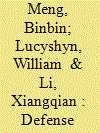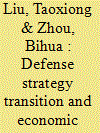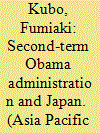| Srl | Item |
| 1 |
ID:
137933


|
|
|
|
|
| Summary/Abstract |
There are conflicting views as to the relationship between a nation’s defense expenditure (DE) and its population’s income inequality (INEQ). DE, always an important part of government budget, can easily crowd out transfer payments, necessary to improve INEQ; however, these payments may also create a demand that may raise the income levels of the lower income earners. Consequently, the relationship between DE and INEQ is an important question. This paper examines the relationship between DE and INEQ in China for the period of 1989–2012. Utilizing basic cointegration and causality tests, our objective is to add to the literature by providing evidence that China’s DE, in fact, do have an impact on INEQ.
|
|
|
|
|
|
|
|
|
|
|
|
|
|
|
|
| 2 |
ID:
137931


|
|
|
|
|
| Summary/Abstract |
This paper develops a growth model for a country under a Hobbesian environment with international conflicts where national defense is the only way to prevent external predation. Different defense strategies result in different growth paths. The long-run growth path is determined by the equilibrium of a dynamic game with three players: the external predator, the government, and the family. The equilibrium growth path can have different phases: submissive equilibrium, tolerant equilibrium, and complete protection equilibrium. Sustainable growth will endogenously induce an adjustment of the defense strategies. As the economy keeps growing, complete protection will eventually be preferred. The optimal growth path prefers to compress the length of the transitional period between incomplete protection and complete protection. Some interesting features of the transitional dynamics are exhibited by a control model with discontinuity.
|
|
|
|
|
|
|
|
|
|
|
|
|
|
|
|
| 3 |
ID:
172783


|
|
|
|
|
| Summary/Abstract |
This study examines the causal nexus between defense expenditure and economic growth in China using the bootstrap Granger full-sample causality test and rolling-window estimation. The full-sample result indicates a positive bidirectional causality between economic growth and defense expenditure, suggesting that more defense spending increases economic growth, and vice versa. By adopting a time-varying rolling-window approach to revisit the dynamic causal relationships, this article identifies that the causality changes over time. We find significant positive short-run causality running from economic growth to defense expenditure in most of the time investigated, thus implying that economic growth stimulates defense expenditure. However, large-scale disarmaments break such positive linkage. Conversely, both positive and negative effects of defense expenditure on economic growth are demonstrated, showing that more defense spending has ambiguous effect on economy. Consequently, economic growth mainly drives defense expenditure rather than the other way around. The impact of defense expenditure in China on national economy is affected by multiplier effect and crowding-out effect as well as institutional factors.
|
|
|
|
|
|
|
|
|
|
|
|
|
|
|
|
| 4 |
ID:
074504


|
|
|
|
|
| Publication |
Santa Monica, Rand Corporation, 1963.
|
| Description |
vi, 32p.
|
|
|
|
|
|
|
|
|
|
|
|
Copies: C:1/I:0,R:0,Q:0
Circulation
| Accession# | Call# | Current Location | Status | Policy | Location |
| 034182 | 355.6220968/WOL 034182 | Main | On Shelf | General | |
|
|
|
|
| 5 |
ID:
175498


|
|
|
|
|
| Summary/Abstract |
The Botswana national security complex is fashioned around traditional (military) threats to security. This is demonstrated through the National Security Act and also by the country’s defense expenditure as a component of its GDP. Defense expenditure routinely takes the second largest share of GDP in Botswana. The outbreak of the novel Severe Acute Respiratory Distress Syndrome Corona Virus 2 (SARS-COV-2) or COVID-19, however, suggests a relook at Botswana’s national security towards none traditional security threats- in this case pandemics. The case for this is made clear by the evidently poor readiness to deal with possible mass infections both from a health budgetary perspective, and the availability of medical personal and equipment. This paper argues for securitisation of health care in Botswana- especially in light of the COVID-19 pandemic. This is possible through diversion of a portion current defense spending towards health care.
|
|
|
|
|
|
|
|
|
|
|
|
|
|
|
|
| 6 |
ID:
120178


|
|
|
|
|
| Publication |
2013.
|
| Summary/Abstract |
The controversy in the Unites States on how to deal with the "fiscal cliff" revealed not just a deep ideological difference between the Democratic Party and the Republican Party but also a new sign of a possible crack of the conservative Republican ranks between those Republicans close to the Tea Party and those who favored the tax hike for the wealthy in order to save the tax cut for the rest of the people.
The planned deep cuts in the defense expenditure will have important implications for national security of Japan, which recently experiences increasing tension with China over the Senkaku Islands. The Obama Administration adopted a tough stance with China over the territorial issues in the South China Sea in July 2010. Rebalance to Asia could be understood, at least in part, to be a response to the rise of China, in a financial situation with fewer resources available for the national defense in the US.
The logical conclusion for Japan and the US would be for both of them to deepen security cooperation. Shinzo Abe, the new Prime Minister of Japan, should further clarify his foreign and national security policy priority and concentrate his efforts on strengthening the alliance with the US and building up the capabilities to defend Japan's territory, while exerting caution in jumping into "history" issues with China and South Korea so that Japan's message on the Senkaku Islands issue is crystal clear and focused: that it is against the established international norm to try to change the status quo by force or intimidation; this message should have universal appeal to a wider international community.
|
|
|
|
|
|
|
|
|
|
|
|
|
|
|
|
| 7 |
ID:
104686


|
|
|